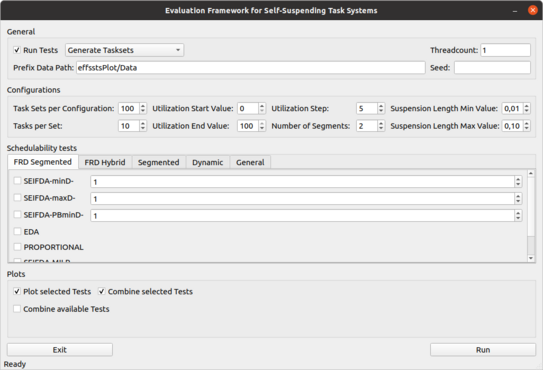Suspension-Aware Design and Analysis
In computing systems, a job may suspend itself, due to the interactions with external I/O devices or accelerators, multicore systems with shared resources, suspension-aware multiprocessor synchronization protocols, etc. For real-time embedded systems, self-suspension behavior negatively impact the schedulability of real-time tasks and typically cause substantial performance/schedulability degradation.
Fig: Two tasks τ1 (higher priority, period 5, relative deadline 5, computation time 3) and τ2 (lower priority, period 7, relative deadline 7, computation time 2) meet their deadlines in (a). Conventional schedulability analysis predicts maximum response times of 3 and 5 respectively. In (b), task τ1 suspends itself, with the result that task τ2 misses its deadline at time 14. (Source: Many suspensions many problems by Chen et al. in RTSJ 2019)
Even though some seemingly positive results have been reported for tackling self-suspending task systems in the past, the recent investigation by Prof. Dr. Jian-Jia Chen and his colleagues indicates that a significant portion of the literature (and also the majority of these results) before 2013 has been seriously flawed. Since most results before 2013 were in fact flawed (or with incomplete proofs), the investigation of self-suspending task models in real-time embedded systems has been restarted since 2015.
This project intends to investigate robust and solid fundamental algorithms and analyses to carefully mitigate (via safe and sound execution/suspension enforcements) and analyze (via tight schedulability tests) the impact of self-suspending behavior in modern real-time embedded systems. The targeting systems are safety-critical systems with real-time requirements. Since the self-suspending behavior can introduce a high degree of complexity, new scheduling strategies or revisions of existing scheduling strategies are required. This project intends to provide fundamental breakthrough in the scheduling theory and the corresponding schedulability analysis to flexibly accommodate the self-suspension behavior without introducing much pessimism when considering the worst-case timing behavior.
With the scheduling strategies and schedulability tests provided in this project, we aim to offer tools for real-time system designers so that further optimizations by considering the perspectives of controllers, communications, and computation are possible.
(Source: DFG)
Project Information
| Duration: | Nov. 2019 - Oct. 2022 (3 years) |
| Resources: |
|
| Hired: | M.Sc. Mario Günzel |
Publications
2023
- Parallel Path Progression DAG Scheduling
Niklas Ueter, Mario Günzel, Georg von der Brüggen, Jian-Jia Chen
IEEE Trans. Computers 72(10): 3002-3016
2023 - Scheduling Periodic Segmented Self-Suspending Tasks without Timing Anomalies.
Ching-Chi Lin, Mario Günzel, Junjie Shi, Tristan Taylan Seidl, Kuan-Hsun Chen, Jian-Jia Chen
IEEE Real-Time and Embedded Technology and Applications Symposium
2023
2022
- End-To-End Timing Analysis in ROS2. (Preprint) (Artifact)
Harun Teper, Mario Günzel, Niklas Ueter, Georg von der Brüggen and Jian-Jia Chen
In 43rd IEEE Real-Time Systems Symposium (RTSS)
2022 - EDF-Like Scheduling for Self-Suspending Real-Time Tasks. (Preprint) (Artifact)
Kuan-Hsun Chen, Mario Günzel, Georg von der Brüggen and Jian-Jia Chen
In 43rd IEEE Real-Time Systems Symposium (RTSS)
2022 - EDF-Like Scheduling for Self-Suspending Real-Time Tasks. (Preprint) (Artifact)
Mario Günzel, Georg von der Brüggen, Kuan-Hsun Chen and Jian-Jia Chen
In 43rd IEEE Real-Time Systems Symposium (RTSS)
2022 - Segment-Level FP-Scheduling in FreeRTOS.
Robin Edmaier, Niklas Ueter, Jian-Jia Chen
IEEE International Conference on Embedded and Real-Time Computing Systems and Applications (RTCSA)
2022 - Type-aware Federated Scheduling for Typed DAG Tasks on Heterogeneous Multicore Platforms.
Ching-Chi Lin, Junjie Shi, Niklas Ueter, Mario Günzel, Jan Reineke and Jian-Jia Chen
IEEE Transactions on Computers
2022 - Parallel Path Progression DAG Scheduling.
Niklas Ueter, Mario Günzel, Georg von der Brüggen and Jian-Jia Chen
CoRR abs/2208.11830
2022 - Unikernel-Based Real-Time Virtualization under Deferrable Servers: Analysis and Realization. (Artifact)
Kuan-Hsun Chen, Mario Günzel, Boguslaw Jablkowski, Markus Buschhoff and Jian-Jia Chen
In 34th Euromicro Conference on Real-Time Systems (ECRTS)
2022
2021
- EDF-Like Scheduling for Self-Suspending Real-Time Tasks
Mario Günzel, Kuan-Hsun Chen, and Jian-Jia Chen
CoRR abs/2111.09725
2021 - Work-in-Progress: Evaluation Framework for Self-Suspending Schedulability Tests
Mario Günzel, Harun Teper, Kuan-Hsun Chen, Georg von der Brüggen, and Jian-Jia Chen,
IEEE Real-Time Systems Symposium (RTSS), pp 532-535
2021 - Suspension-Aware Fixed-Priority Schedulability Test with Arbitrary Deadlines And Arrival Curves.
Mario Günzel, Niklas Ueter, and Jian-Jia Chen,
IEEE Real-Time Systems Symposium (RTSS), pp 418-430
2021 - HEART: Hybrid memory and Energy-Aware Real-Time scheduling for multi-processor systems
Mario Guenzel, Christian Hakert, Kuan-Hsun Chen and Jian-Jia Chen.
In 21th International Conference on Embedded Software (EMSOFT)
ACM Transactions on Embedded Computing Systems, Volume 20, Issue 5s, October 2021, Article No.: 88, pp 1–23
2021 - Hard Real-Time Stationary GANG Scheduling.
Niklas Ueter, Mario Günzel, Georg von der Brüggen and Jian-Jia Chen.
In 33rd Euromicro Conference on Real-Time Systems (ECRTS), pp. 10:1-10:19
2021 - On the Formalism and Properties of Timing Analyses in Real-Time Embedded Systems.
Jian-Jia Chen, Wen-Hung Huang, Georg von der Brüggen, Kuan-Hsun Chen, Niklas Ueter.
In A Journey of Embedded and Cyber-Physical Systems - Essays Dedicated to Peter Marwedel on the Occasion of His 70th Birthday.
2021 - A note on slack enforcement mechanisms for self-suspending tasks
Mario Günzel and Jian-Jia Chen.
Real Time Systems Journal, Volume 57, Issue 4, pp. 387–396.
2021
2020
- Suspension-Aware Earliest-Deadline-First Scheduling Analysis.
Mario Günzel, Georg Brüggen and Jian-Jia Chen.
IEEE Trans. Comput. Aided Des. Integr. Circuits Syst. 39(11): 4205-4216
(presented in ACM Conference on Embedded Software, EMSOFT)
2020 - Correspondence Article: Counterexample for suspension-aware schedulability analysis of EDF scheduling.
Mario Günzel and Jian-Jia Chen.
Real Time Systems Journal, 56(4): 490-493 (2020)
2020 - On Schedulability Analysis of EDF Scheduling by Considering Suspension as Blocking.
Mario Günzel and Jian-Jia Chen.
CoRR abs/2001.05747
2020
2019
- Scheduling Self-Suspending Tasks: New and Old Results
Jian-Jia Chen, Tobias Hahn, Ruben Hoeksma, Nicole Megow, Georg von der Brüggen.
In 31st Euromicro Conference on Real-Time Systems (ECRTS), pp. 16:1-16:23
2019
Tools
- https://github.com/tu-dortmund-ls12-rt/SSSEvaluation
- Correspodning paper can be found in "Work-in-Progress: Evaluation Framework for Self-Suspending Schedulability Tests" by Mario Günzel, Harun Teper, Kuan-Hsun Chen, Georg von der Brüggen, and Jian-Jia Chen, IEEE Real-Time Systems Symposium (RTSS), pp 532-535, 2021



